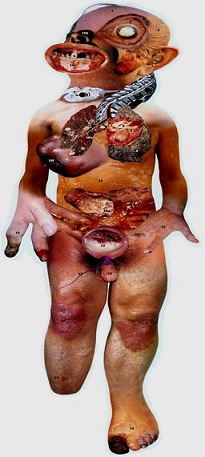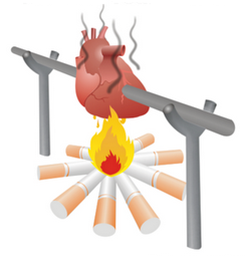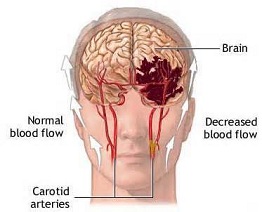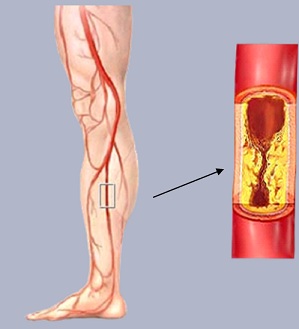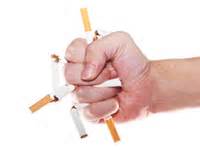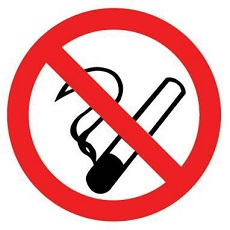A lot has been said and written about the dangers of smoking, we are warned about it by the inscriptions on each pack of cigarettes: "SMOKING KILLS." Nevertheless, millions of people around the world continue to smoke. And thereby increase the risk of developing myocardial infarction, cerebral stroke, pulmonary and oncological diseases.
Nicotine and carbon monoxide contained in cigarette smoke inhaled during smoking reduce the oxygen concentration in the smoker's blood. These substances activate the processes of blood coagulation and thrombus formation. They can directly damage the vascular endothelium (the lining of blood vessels) and contribute to the formation of atherosclerotic plaques. In addition, smoking lowers the level of "good" cholesterol in the blood and increases the level of "bad" cholesterol.
Substances contained in cigarette smoke (which are more than 300 different chemical compounds) have a direct vasoconstrictor effect. They can cause acute vasospasm.
This is especially detrimental to the blood supply to the heart, brain, kidneys and lower extremities. Severe atherosclerotic vascular lesions of the lower extremities (peripheral atherosclerosis) occurs almost exclusively in smokers. Smoking even one cigarette at & nbsp; previously non-smokers lead to an increase in blood pressure. & nbsp; It was found that smokers, more often than nonsmokers, have sudden coronary death and life-threatening arrhythmias.
When smoking, the respiratory function suffers significantly. A smoker's habit is coughing up phlegm in the morning, shortness of breath and other symptoms of respiratory distress.
The harm from smoking
Every 6.5 seconds on the planet, 1 person dies from a disease associated with tobacco use
Smoking leads to hair loss, tooth decay, skin cancer
Regular smoking of even one cigarette a day cannot be considered safe.
Smoking shortens life expectancy by an average of 7 years
Smoking increases the risk of developing impotence
Children especially suffer from secondhand smoke. Parental smoking is one of the risk factors for sudden infant mortality syndrome
Quitting smoking abruptly is not harmful, it's a myth
Smoking increases the risk of lung disease, especially lung cancer by 10-30 times
Tobacco smoke contains more than 4000 chemical elements, of which> 250 are toxic or carcinogenic
Smoking increases the risk of developing arterial hypertension
The effects of smoking are dose-dependent, however, regular smoking of even 1 cigarette per day cannot be considered safe.
People who start smoking in adolescence and smoke for 20 years or more reduce their life expectancy by 20 to 25 years.
The risk of cardiovascular disease is high with all forms of tobacco use
The use of "light" brands of cigarettes does not reduce the risk of complications
Smoking leads to impaired sperm formation
The opinion that heavy smokers should not completely quit smoking, even if they become sick due to this habit, is wrong.
Quitting smoking abruptly is not harmful, it's a myth
Tips for typical situations
1. Boredom or strong emotions
- Whenever something upsets you, try a change of scenery or take a walk around the area.
- Talk to someone. Call a friend or talk to some of your non-smoking work colleagues.
- Read a magazine or book. Choose literature that is interesting and easy to read for you.
- Have fun. Watch your favorite movie or movie you've been looking forward to.
- Keep yourself busy. Take on work that has been put off for a long time.
- Warn friends and family that you may be in a bad mood for several weeks.
- Ask your loved ones to be tolerant of you. Try to avoid conflict situations.
- If you are very irritable, train yourself to slowly count to 10 in your head to calm yourself down.
- If you are tense, take a slow deep breath, and then exhale 2 times longer.
- Take time to relax every day. Use breathing exercises and muscle relaxation.
- Get yourself in motion! Take a walk in the courtyard or the area, visit.
- Make it a rule to do something that you enjoy every day.
- If anxiety or depression bothers you very much, do not be afraid to see a therapist!
& nbsp; 2. The habit of relaxing with cigarettes
- Sit in a comfortable chair and relax for 10-15 minutes. Play some relaxing music.
- Take a deep, slow breath, then exhale 2 times longer.
- Take a short walk or exercise.
- Do something that usually calms you down. Let's say, your hobby or some household chores.
- Take a break: play something, solve a puzzle or take a shower (bath).
- Do something that you normally enjoy. Make and add to your to-do list.
- Ask your loved ones not to interfere with your favorite TV shows and music for 2 weeks.
- If you used to smoke in a certain place, try not to stay there for a long time.
- If the cigarette served as a "reward" for you, find another means for this (relaxation, etc.).
- Plan ahead of time what you will do when your body normally needs a cigarette.
3. Contact with smokers
- For the first few weeks, try to stay away from smokers: they may buy you a cigarette.
- Tell your smokers that you have quit smoking due to health problems.
- Think in advance what you can say in such a situation to those smokers around you.
- Ask smoking friends not to offer you cigarettes, to support you in your decision to quit smoking.
- If you are about to meet a smoker, practice saying “no, thanks, I quit!”
- You can prevent such situations. Warn your interlocutor in advance that you have quit smoking.
- Go to non-smoking areas. Take a nonsmoking place in restaurants and cafes.
4. Smoking while driving
- Remove the ashtray from the car or, after washing it, place a photo of your loved one in it.
- Lower the glass (weather permitting). Try to breathe deeper.
- Keep gum or low-calorie snacks in the machine. Use them whenever you feel like smoking.
- If you are driving with someone you know, ask them not to smoke.
- Think that the car interiors of smoking motorists will stink of cigarette smoke for a long time.
5. Smoking after meals
- Don't stay at the table. After a meal, get up immediately and switch to another activity.
- Eat low-calorie foods so you can continue eating after your main meal.
- Brush your teeth immediately after eating. If you eat out, carry a toothbrush and toothpaste with you.
- After meals, use a mouthwash or scented spray to freshen the breath.
- When in a restaurant or cafe, always stay in a non-smoking area.
- If you are eating alone, immediately after eating, be distracted by a telephone conversation with someone you know.
- Always carry some low-calorie foods with you. Keep them in your car, at work, etc.
- Keep sugar-free gum in your bag or pocket. Try several different flavors.
6. Smoking in front of the TV
- While watching TV, keep your hands busy with a puzzle, sewing, solitaire, a newspaper, or something else.
- During advertising, you can walk around the apartment, do a small set of physical exercises.
- While watching TV, you can eat something light and harmless, or slowly drink water with lemon juice.
- If you have a strong urge to smoke while sitting in front of the TV, temporarily quit this activity.
- You can temporarily replace watching TV with music, going to the cinema, playing cards, or something else.
7. Smoking over a cup of tea or coffee
- Change your habits. Sit in a different chair, use a different cup, or drink while standing.
- Try a new type of tea or coffee and try to describe its flavor.
- Drink slowly: with the drink in your mouth, swallow it no earlier than mentally counting to three.
- Drink tea (coffee) with a small amount of some low-calorie food - crackers, toast, etc.
- Take a break from the urge to smoke while drinking tea by chatting or reading the newspaper. Change your habits.
8. The need to concentrate
- Decreased concentration is one of the nicotine withdrawal symptoms that always accompanies smoking cessation.
- If you have important work ahead of you, take more time for it than is usually required.
- If you can't maintain a high level of attention for a long time, work in short cycles.
- Remember: Your abilities are the same. When the power is really needed, it will appear.
- When you need to cheer up, "wake up", take a short walk, for example, to the store.
- Chew gum or a low-calorie meal to increase concentration while you work.
9. Smoking and alcohol
- The best solution is not to drink alcohol. Drink juice or any other soft drinks.
- If you cannot avoid drinking alcohol, limit yourself to just one drink.
- If you consume more than one serving of alcohol daily, you may be addicted.
- Plan your behavior in advance: stay close to non-smokers, talk more, get your hands on.
- To get rid of your alcohol addiction, do not be afraid to see a psychotherapist / narcologist.
10. Smoking as part of the image
- Think: are cigarettes so inseparable from the impression you are trying to make on people?
- Refine your look. Match him with new clothes, haircuts or accessories.
- Many men like women who smoke, but most of them strongly oppose smoking their wives.
- Remember that the image of a smoker is quickly complemented by yellow teeth, an unhealthy complexion and bad breath.
- Think, what is more important for you: not to stand out from the crowd of smokers or to follow your own common sense?
- The cigarette as part of the style has been promoted by tobacco companies for many years: through advertising and covertly through films.
- Remember, it wasn't smoking that made your smoking idols successful and attractive. This is their weakness.
- Think of those actors and models who promoted smoking and later died of cancer.
- Smoking was fashionable 20 years ago, but not now: the popularity of smoking is falling rapidly.
Positive changes in smoking cessation
Better late than never…
- after 2 hours, nicotine begins to be removed from the body and at this moment the first withdrawal symptoms are felt
- After 12 hours, carbon monoxide from smoking will be completely eliminated from the body, the lungs will begin to function better, the feeling of lack of air will pass
- After 2 days, taste and sense of smell will become more acute
- after 12 weeks (3 months), the circulatory system improves, making walking and running easier
- after 3-9 months cough, shortness of breath and breathing problems decrease, lung function increases by 10 & nbsp;%
- in 5 years the risk of myocardial infarction will be 2 times less than that of smokers
By quitting smoking you will also:
- Reduce the risk of myocardial infarction by 50% in the first year after quitting smoking
- Reduce the risk of developing COPD (80-90% caused by smoking - "smoker's bronchitis")
- Reduce the risk of stroke
- Protect children from secondhand smoke
- Save your family budget up to 12,000 rubles a year & nbsp;
Already in the first weeks and months after quitting smoking:
- The level of blood pressure in hypertensive patients decreases
- Pulse decreases (normalizes)
- Blood gas composition normalizes
- Morning cough decreases
- Lung function is increased by 30%
- Shortness of breath, weakness, fatigue decreases
- Increased exercise tolerance
- Improves peripheral circulation
- The ability to smell and taste is restored
- Improves complexion, skin condition
- The head becomes clearer, memory improves, mental performance increases
Additional benefits of quitting smoking:
- Improving well-being
- Saving money
- Improving self-esteem
- Disappearance of unpleasant odors from the house, car, etc.
- A positive example for children
- Protecting the health of loved ones
- Improving physical performance
- Improving appearance (skin, teeth)
All of the above are arguments in favor of quitting smoking. We need to gain willpower and give up this addiction.
